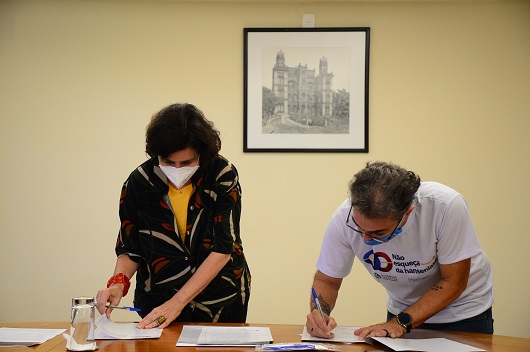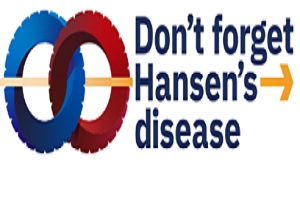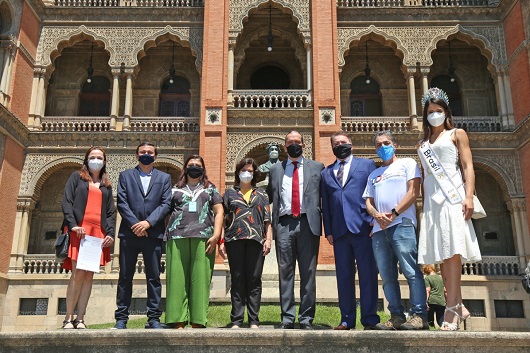Fiocruz celebrates cooperation and holds a seminar on Hansen's disease
22/11/2021
Cristina Azevedo (Fiocruz News Agency)
With two actions this week, Fiocruz became even more engaged in the fight against Hansen's, a neglected disease that had its situation aggravated during the COVID-19 pandemic. On Wednesday (11/17), the Foundation signed a Cooperation Agreement for joining the global campaign Don't Forget Hansen's Disease, with the state government and other partners, in addition to lighting the castle with purple at night as one of the actions to raise awareness. This Thursday (11/18), Fiocruz deepened the debate during the 1st Symposium on Neglected Diseases Fiocruz-Novartis: focus on Chagas and Hansen's diseases.
Nisia Trindade Lima and Artur Custódio sign the cooperation agreement at Fiocruz (Photo: Peter Ilicciev)
The most recent data make clear the issue urgency: the diagnosis of new cases in the country fell by half from 2019 to 2020, according to the Brazilian Ministry of Health. A fact that the Movement of Reintegration of Persons Afflicted by Hansen's Disease (Morhan), one of the Cooperation Agreement signatory organizations, defined as “underdiagnosis, even more serious than underreporting”.
Neglected populations
The campaign Don't Forget Hansen's Disease was launched by World Health Organization (WHO) goodwill ambassador Yohei Sasakawa. In Rio, it won the support of the State Health Department, the State Council of Municipal Health Departments (Cosems-RJ), the Carlos Chagas Institute, the University Network for Combating Hansen's (ReúnaHans / RJ), the Brazilian Society of Dermatology (SBD), in addition to Morhan and Fiocruz. The signatories undertake to promote awareness and fight discrimination suffered by people affected by the disease, among other actions.
Hansen's is a chronic infectious disease, which mainly affects the peripheral nerves, eyes and skin, mainly affecting populations in poorer regions. However, the disease has treatment and cure. Brazil is the second country with the highest number of cases, just behind India, according to the WHO. In 2019, 27,864 new cases were reported in Brazilian territory.
“Our institution has a research laboratory dedicated to Hansen's and, at this moment, it is working intensively with the issue of a more accurate diagnosis and also with a vaccine development”, said Nísia Trindade Lima, Fiocruz president, referring to the Hansen's Disease Laboratory of the Oswaldo Cruz Institute (IOC). "As we say here at Fiocruz, more than neglected diseases, they are neglected populations," she added.
Increased cases with sequelae
Morhan's national coordinator and national health adviser, Artur Custódio highlighted the “forgetting” of various diseases during the pandemic. “In Hansen's there was a drop of almost 55% in diagnoses. And we are already starting to see the effects in 2021, as cases with sequelae are starting to arrive. In Rio de Janeiro, there are almost 20% of new cases with sequelae”, he stated.
Next to the campaign's motto, there are two gears that represent the bicycle wheels: the first symbolizes biomedical actions, such as research and treatment. And the second, social actions, such as fighting stigma. “One wheel cannot go without the other, and the arrow indicates forward movement,” explained Custódio. "It's not just a health action. It requires integration with other society sectors."
The State Undersecretary for Surveillance and Primary Health Care (Subvaps), Mario Sérgio Ribeiro, highlighted that “this signature is not a pro forma act. We are going to continue our work with Hansen's and the Rio de Janeiro state population”, said Ribeiro. The ceremony was also attended by the Cosems-RJ first vice president, Maria Augusta Monteiro; Sandra Maria Barbosa Durães, coordinator of the Hansen's Department at SBD; Ricardo Cavalcanti Ribeiro, president of the Carlos Chagas Medical Postgraduate Institute; the Rio de Janeiro state coordinator of Morhan, Rafael Feitosa; the vice coordinator of ReúnaHans/RJ, Daisy Almeida Bastos; researcher Roberta Olmo, from the Hansen's Disease Laboratory at IOC/Fiocruz; and Miss Brasil World CNB 2021, Caroline Teixeira, who is an ambassador for the cause for the Hansen's elimination and signed the document as an attestant.
The signatories of the Cooperation Agreement (Photo: Peter Ilicciev)
New Platforms for Old Diseases
The work to eliminate Hansen's and other old diseases from the world can benefit from the use of new platforms. This was one of the points raised at the 1st Symposium on Neglected Diseases Fiocruz-Novartis: focus on Chagas disease and Hansen's. Open to the public, the webinar discussed topics such as the public policies importance for neglected diseases and a comprehensive approach to patient care, in addition to having two specific tables on Chagas disease and Hansen's.
At the opening, Marco Aurelio Krieger, vice president of Production and Innovation in Health at Fiocruz, highlighted the work with Novartis, which started even before the pandemic, and the possibilities that this brings. "This partnership aims to establish a field of development and cooperation so that we can work on new technological platforms for health, as in the pandemic case, but also use them for traditional problems that still persist in much of the world, such as neglected diseases.” Krieger recalled that Fiocruz has been working with these diseases since its creation, 121 years ago, and cites the Chagas disease description and its vector as an example. But he also highlighted that the Foundation has been testing new solutions and diagnostic tools. In the field of Hansen's, he highlighted the work with Novartis to seek better diagnosis and disease control, as well as the dissemination of knowledge.
The partnership to carry out the webinar is the Memorandum of Understanding signed between Fiocruz and Novartis result, with the objective of establishing international cooperation for the activities developed in areas of teaching, research, technological development, communication, information, management and policies in the field of health, with a focus on neglected diseases. Renato Carvalho, Novartis Brasil CEO, said he hopes that this seminar will be just the first in a journey that brings returns and helps health in Brazil. The company has been in the country for 85 years, where it has more than 60 research in progress. “It's very important to generate science and encourage new scientists,” he said, citing a company's student aid program.
Rômulo Paes, a researcher at the René Rachou Research Institute (Fiocruz Minas) and vice president of the Brazilian Association of Collective Health (Abrasco), brought the debate on health and the post-pandemic to the field of Agenda 2030. “This pandemic by COVID -19 is better explained by our living conditions than by the etiological agent”, he said. He stressed that interventions must be based on scientific knowledge, ensure greater equity, such as access to vaccines, and “not leave anyone behind”. “At this crisis moment, the Agenda presents alternatives. It is up to us to face the disease not only as a country, but as a planet.”


